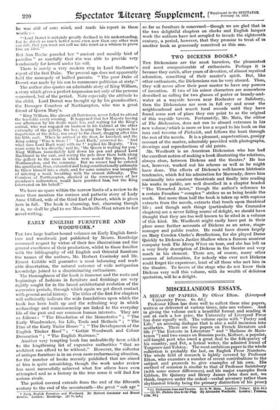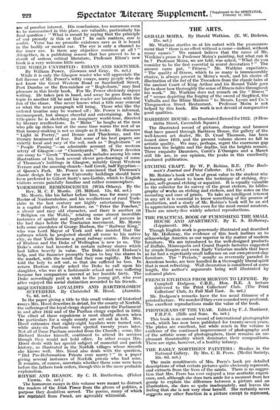MISCELLANEOUS ESSAYS.
Professor Elton has done well to collect these nine papers, written or delivered at various times, into one volume. And in giving the volume such a beautiful format and sending it out at such a low price, the University of Liverpool Press has done equally well. The volume opens with " Poetry and Life," an amusing dialogue that is also a mild incursion into aesthetics. There are two papers on French literature and life ("- The Entente in Literature " and " Madame de Main- tenon ") and two essays on Russian poets, Koltsov, a popular, self-taught poet who owed a great deal to the folk-poetry of his country, and Fet, a lyrical writer, the admired friend of Turgenev and Tolstoy. The most ambitious paper in the whole collection is probably the last, on English Prose Numbers_ Thewhole field of research is lightly covered by Professor Elton, who examines a number of recent contributions to the subject and proceeds to give examples of his own. His method of scansion is similar to that of Professor Saintsbury (with some minor differences), and his major examples from Gibbon, De Quincey and Henry James (who does not, we think, improve under the ordeal—verbal accuracy rather than rhythmical felicity being the primary distinction of his prose)
• (1) Dickensian Inns and Taverns. By B. W. Matz. London : Palmer. (10s. 6d-i —(2) Mr. Mama Goss to Wiley, By Alexander Weolloutt. -London : Putnam. L12a,
are of peculiar interest. His conclusions, too numerous even to be summarized in this place, are valuable, particularly his
final question : " What is meant by saying that the principle of our prosody is this or that ? In such matters, esse is audiri. Verse has no prosodic existence save as it is heard in the bodily or mental ear. The eye is only a channel to the inner ear. Is there any objective common at all ? " Altogether, in a publishing season that has proved to be a desert of serious critical literature, Professor Elton's new book is a very welcome little oasis.



































































 Previous page
Previous page